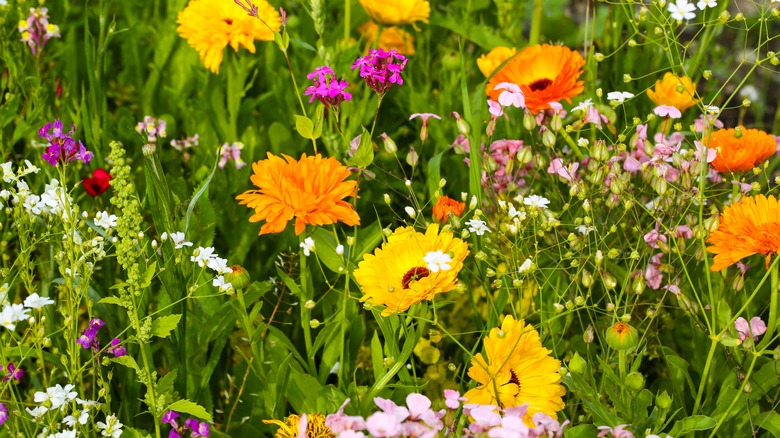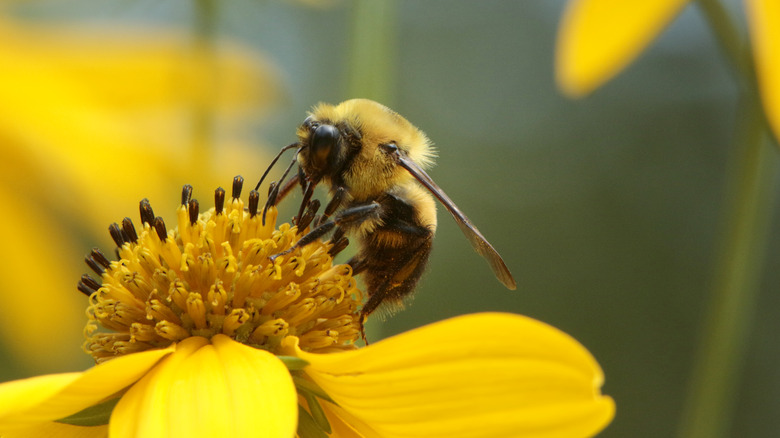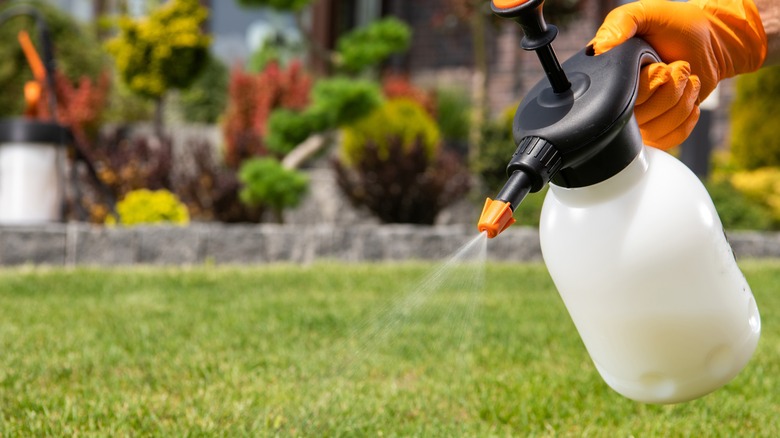Can Wildflower Seeds Be Dangerous For Pollinators? Here's What You Should Know
Growing native wildflowers is a great way to help bees and other pollinators, but the options can potentially be overwhelming. Not only can seed packets at big box stores sometimes contain invasive species that don't belong in your region, but you may also have concerns about what, if any, insecticides or pesticides the seeds have been treated with. One type of product you may have heard of are neonicotinoids (also called neonics). This is a group of pesticides that can be used to treat growing plants as well as seeds. While neonics are less damaging in some ways than other pesticides, they have also been found to cause unintended harm to bees and other pollinators. Fortunately, while the harm caused by neonics is real, seeds produced for use in home gardens are not treated with neonicotinoids.
Neonics were used on live plants sold at garden centers until recently. This was a major concern for homeowners looking to grow pollinator-friendly flowers, but these have largely been phased out at Home Depot, Lowe's, and many other garden centers and big box stores. Bulbs and plants like cacti that are still treated are generally clearly labeled as such at stores and seed companies. While seeds treated with neonics do exist, these are marketed to and intended for farmers growing agricultural crops like soybeans and corn. Although there are steps you can take protect bees and other pollinators from neonics if you use these pesticides in your yard, you don't need to worry about undisclosed neonics on wildflower or other seeds purchased from reputable shops or seed companies.
Buying wildflower seeds for pollinators
Most reputable seed companies offer detailed information on what, if anything, their seeds, including wildflower seeds, are treated with. Not only should this give you additional assurance that your seeds are not treated with neonics, but it also lets you know if the seeds have been treated with fungicides or coatings. These tend to be uncommon on wildflower seed mixes, though some seeds may be pelleted to make them easier to work with.
One of the biggest things to keep in mind when buying wildflower seeds is that they are appropriate for your region and don't contain seeds for any invasive plants. Sadly, even if you check your seed packet's label carefully and all the species listed are perfect for your region, invasive seeds may slip in. When the Invasive Species Council of British Columbia tested seeds from wildflower seed mixes, they found that many of the mixes tested included at least some seeds for plants that are considered noxious weeds in parts of Canada and the United States. They even found the dangerous and supersized weed known as giant hogweed (Heracleum mantegazzianum) in some of the seed mixes. If you are concerned about the possibility of invasive or dangerous species making their way into your wildflower seed mixes, one of the best solutions is to create your own seed mix. This ensures you have full control over the exact wildflowers growing in your garden and guarantees that they're perfect for your region and growing conditions.
Additional ways to protect pollinators
While you don't need to worry about exposing your local bees and other pollinators to neonics via wildflower seeds, if you have treated or plan to treat your lawn or other plants with neonics like imidacloprid then there may be some additional steps you can take to help protect local pollinators. Be sure to carefully follow the instructions on the pesticide label, using only the recommended amount, and never apply neonics to plants that are in bloom, including lawn weeds.
Additionally, don't assume your lawn requires neonics or any other insecticides, as healthy lawns often do just fine without these treatments. If you do have a lawn grub problem, consider trying methods like beneficial nematodes first. If you must use neonics to treat your lawn grubs or other pests, avoid growing flowers in or near that area as they may absorb some of the pesticide from the soil.


